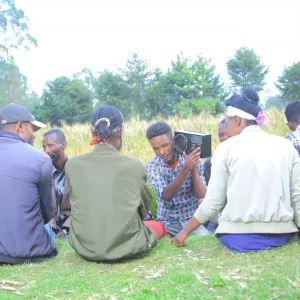From listeners to changemakers: Transforming sheep fattening through native-language radio programs and knowledge networks
Broadcasting innovations in livestock production through native-language radio programs are crucial for effective communication with farmers. It is an effective tool to promote agriculture and development in rural areas and facilitate knowledge sharing and peer learning among farmers. Broadcasting in the native language ensures easy understanding, overcomes language barriers, and enhances the relevance and impact of communication. The International Center

From listeners to changemakers: Transforming sheep fattening through native-language radio programs and knowledge networks
Broadcasting innovations in livestock production through native-language radio programs are crucial for effective communication with farmers. It is an effective tool to promote agriculture and development in rural areas and facilitate knowledge sharing and peer learning among farmers. Broadcasting in the native language ensures easy understanding, overcomes language barriers, and enhances the relevance and impact of communication.
The International Center for Agricultural Research in the Dry Areas (ICARDA) has launched a radio program focusing on sheep fattening in Ethiopia’s southern and northern regions. This program is broadcast in six native languages, namely Hadiya, Kambata, Tambaro, Halaba, Silte and Amharic, to reach and engage with local communities effectively.
The Sheep Fattening Radio program takes an interactive approach, using community dialogue, conversations, and dramatic broadcasts. This format allows farmers to actively participate by sharing their comments, suggestions, and questions. The baseline survey revealed that farmers highly value radio as an efficient medium for receiving agricultural innovations due to its convenience and ready accessibility.

The radio intervention approach is based on an experimental design involving three clusters at kebele (village) level: encouraged listeners, non-encouraged listeners, and a control group. The encouraged listener’s group consistently follows the radio program’s lessons and applies them to positively transform their community. The listening groups consist of youth, women, and proactive individuals, with 10 people per language group.
The midterm evaluation of the radio program shows significant improvements in attitude, knowledge, and practices related to feeding, health, entrepreneurship, and gender issues. Before the program aired, farmers did not pay sufficient attention to feeding based on nutrient requirements, deworming, and vaccination. However, through regular follow-up through the radio program, they have become change-makers, adopting improved practices.

The radio program on sheep fattening has demonstrated its effectiveness in promoting knowledge dissemination and behaviour change among farmers. The mid-term evaluation highlights the positive impact on various aspects of sheep fattening. Based on these findings, it is recommended that the radio program be continued and expanded to ensure sustained engagement with the farming communities. Additionally, efforts should be made to integrate complementary extension services and on-site support to enhance the program’s effectiveness further and maximize its impact on sustainable sheep-fattening practices.
Written by Muluken Zeleke (ICARDA), Jane Wamatu (ICARDA) and Tesfaye Abiso (AREKA)
Photos by Getenet Fikre (Israel Production Hossana)

